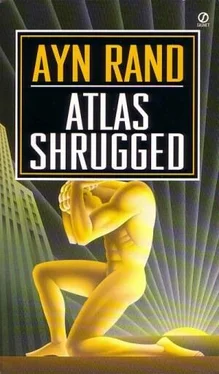He had never had to work so hard; he had done his job as conscientiously well as he had always done any assignment; but it was as if he had worked in a vacuum, as if his energy had found no transmitters and had run into the sands of . . . of some such desert as the one beyond the window of the Comet. He shuddered: he felt a moment's kinship with the stalled engine of the train.
After a while, he summoned the conductor once more. "How is it going?" he asked.
The conductor shrugged and shook his head.
"Send the fireman to a track phone. Have him tell the Division Headquarters to send us the best mechanic available."
"Yes, sir."
There was nothing to see beyond the window; turning off the light, Eddie Willers could distinguish a gray spread dotted by the black spots of cacti, with no start to it and no end. He wondered how men had ever ventured to cross it, and at what price, in the days when there were no trains. He jerked his head away and snapped on the light.
It was only the fact that the Comet was in exile, he thought, mat gave him this sense of pressing anxiety. She was stalled on an alien rail—on the borrowed track of the Atlantic Southern that ran through Arizona, the track they were using without payment. He had to get her out of here, he thought; he would not feel like this once they returned to their own rail. But the junction suddenly seemed an insurmountable distance away: on the shore of the Mississippi, at the Taggart Bridge.
No, he thought, that was not all. He had to admit to himself what images were nagging him with a sense of uneasiness he could neither grasp nor dispel; they were too meaningless to define and too inexplicable to dismiss. One was the image of a way station they had passed without stopping, more than two hours ago: he had noticed the empty platform and the brightly lighted windows of the small station building; the lights came from empty rooms; he had seen no single human figure, neither in the building nor on the tracks outside. The other image was of the next way station they had passed: its platform was jammed with an agitated mob. Now they were far beyond the reach of the light or sound of any station.
He had to get the Comet out of here, he thought. He wondered why he felt it with such urgency and why it had seemed so crucially important to re-establish the Comet's run. A mere handful of passengers was rattling in her empty cars; men had no place to go and no goals to reach. It was not for their sake that he had struggled; he could not say for whose. Two phrases stood as the answer in his mind, driving him with the vagueness of a prayer and the scalding force of an absolute.
One was: From Ocean to Ocean, forever—the other was: Don't let it go! . . .
The conductor returned an hour later, with the fireman, whose face looked oddly grim.
"Mr. Willers," said the fireman slowly, "Division Headquarters does not answer."
Eddie Willers sat up, his mind refusing to believe it, yet knowing suddenly that for some inexplicable reason this was what he had expected. "It's impossible!" he said, his voice low; the fireman was looking at him, not moving. "The track phone must have been out of order."
"No, Mr. Willers. It was not out of order. The line was alive all right.
The Division Headquarters wasn't. I mean, there was no one there to answer, or else no one who cared to."
"But you know that that's impossible!"
The fireman shrugged; men did not consider any disaster impossible these days.
Eddie Willers leaped to his feet. "Go down the length of the train," he ordered the conductor. "Knock on all the doors—the occupied ones, that is—and see whether there's an electrical engineer aboard."
"Yes, sir."
Eddie knew that they felt, as he felt it, that they would find no such man; not among the lethargic, extinguished faces of the passengers they had seen. "Come on," he ordered, turning to the fireman.
They climbed together aboard the locomotive. The gray-haired engineer was sitting in his chair, staring out at the cacti. The engine's headlight had stayed on and it stretched out into the night, motionless and straight, reaching nothing but the dissolving blur of crossties.
"Let's try to find what's wrong," said Eddie, removing his. coat, his voice half-order, half-plea. "Let's try some more."
"Yes, sir," said the engineer, without resentment or hope.
The engineer had exhausted his meager store of knowledge; he had checked every source of trouble he could think of. He went crawling over and under the machinery, unscrewing its parts and screwing them back again, taking out pieces and replacing them, dismembering the motors at random, like a child taking a clock apart, but without the child's conviction that knowledge is possible.
The fireman kept leaning out of the cab's window, glancing at the black stillness and shivering, as if from the night air that was growing colder.
"Don't worry," said Eddie Willers, assuming a tone of confidence.
"We've got to do our best, but if we fail, they'll send us help sooner or later. They don't abandon trains in the middle of nowhere."
"They didn't used to," said the fireman.
Once in a while, the engineer raised his grease-smeared face to look at the grease-smeared face and shirt of Eddie Willers. "What's the use, Mr. Willers?" he asked.
"We can't let it go!" Eddie answered fiercely; he knew dimly that what he meant was more than the Comet . . . and more than the railroad.
Moving from the cab through the three motor units and back to the cab again, his hands bleeding, his shirt sticking to his back, Eddie Willers was struggling to remember everything he had ever known about engines, anything he had learned in college, and earlier: anything he had picked up in those days when the station agents at Rockdale Station used to chase him off the rungs of their lumbering switch engines.
The pieces connected to nothing; his brain seemed jammed and tight; he knew that motors were not his profession, he knew that he did not know and that it was now a matter of life or death for him to discover the knowledge. He was looking at the cylinders, the blades, the wires, the control panels still winking with lights. He was struggling not to allow into his mind the thought that was pressing against its periphery: What were the chances and how long would it take—according to the mathematical theory of probability—for primitive men, working by rule-of-thumb, to hit the right combination of parts and re-create the motor of this engine?
"What's the use, Mr. Willers?" moaned the engineer.
"We can't let it go!" he cried.
He did not know how many hours had passed when he heard the fireman shout suddenly, "Mr. Willers! Look!"
The fireman was leaning out the window, pointing into the darkness behind them.
Eddie Willers looked. An odd little light was swinging jerkily far in the distance; it seemed to be advancing at an imperceptible rate; it did not look like any sort of light he could identify.
After a while, it seemed to him that he distinguished some large black shapes advancing slowly; they were moving in a line parallel with the track; the spot of light hung low over the ground, swinging; he strained his ears, but heard nothing.
Then he caught a feeble, muffled beat that sounded like the hoofs of horses. The two men beside him were watching the black shapes with a look of growing terror, as if some supernatural apparition were advancing upon them out of the desert night. In the moment when they chuckled suddenly, joyously, recognizing the shapes, it was Eddie's face that froze into a look of terror at the sight of a ghost more frightening than any they could have expected: it was a train of covered wagons.
The swinging lantern jerked to a stop by the side of the engine. "Hey, bud, can I give you a lift?" called a man who seemed to be the leader; he was chuckling. "Stuck, aren't you?"
Читать дальше










